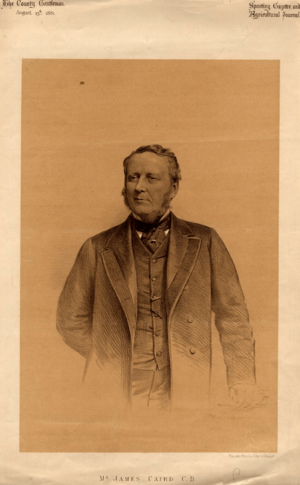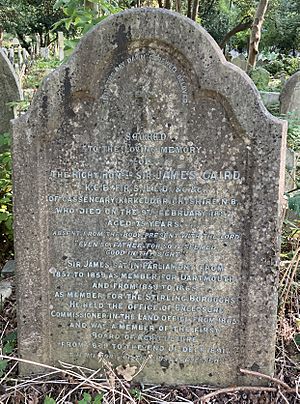James Caird (politician) facts for kids
Sir James Caird (born July 10, 1816 – died February 9, 1892) was an important Scottish expert on farming and a politician. He believed in "economic liberalism," which means he thought people should be free to buy and sell things without too many government rules. Because of his ideas, he advised important leaders like Sir Robert Peel and later Benjamin Disraeli. He also studied big food shortages, called famines, in Ireland and India.
Contents
Sir James Caird's Life and Work
James Caird was born in Stranraer, Scotland. He went to school at Edinburgh High School and then studied at the University of Edinburgh. Later, he became a Member of Parliament (MP). He represented the area of Dartmouth from 1857 to 1859. Then, he represented Stirling Burghs from 1859 to 1865.
Caird started his career as a farmer. He was a "progressive farmer," meaning he used new and better methods. He then became a landowner in Kirkcudbrightshire. He became a strong supporter of free-trade for farmers. This meant he believed farmers should be able to trade their goods freely.
In 1849, he wrote a book called High Farming as the best Substitute for Protection. This book caught the eye of the Prime Minister, Sir Robert Peel. Peel saw Caird as a very knowledgeable person. He asked Caird to study farming and the terrible famine in Ireland. Caird then became known for his economic ideas, which were similar to Peel's. In 1850, he wrote another book, The Plantation Scheme: Or, the West of Ireland as a Field of Investment. He also traveled to America and Canada.
Important Roles and Travels
In 1865, James Caird was made a Fellow of the Royal Society. This is a very old and respected group for scientists. From 1880 to 1882, he was the President of the Royal Statistical Society. In 1889, he became a Privy Counsellor, which is a special advisor to the King or Queen.
Caird traveled to India in October 1878. He joined a group of people who were inspecting famines there. He had strong opinions about how to help people during a famine. He believed that the main goal of famine relief should be to save lives. He did not agree with making people pass "fitness tests" or work for wages if they were starving. He thought the way India was governed needed big changes. He felt that farmers should be paid with crops, not just money. He even thought that some parts of the government that collected land taxes should be changed or removed.
In 1882, he was a senior member of the Land Commission. From 1889 to 1891, he directed the land department of the Board of Agriculture. He was recognized for his work and was given special honors. He became a CB in 1869 and a KCB in 1882.
Sir James Caird passed away on February 9, 1892. He was buried in Highgate Cemetery in London.
Sir James Caird's Family
In 1865, James Caird married Elizabeth Jane Dudgeon (1826-1899). She was the daughter of Robert Dudgeon from Hastings. Elizabeth Jane is buried next to her husband in Highgate Cemetery.
Sir James Caird's Writings
Sir James Caird wrote several important books about farming and economics. These include:
- English Agriculture in 1850-51 (published in London, 1852)
- The Plantation Scheme; Or, the West of Ireland as a Field of Investment (published in Edinburgh, 1850)
 | Dorothy Vaughan |
 | Charles Henry Turner |
 | Hildrus Poindexter |
 | Henry Cecil McBay |



